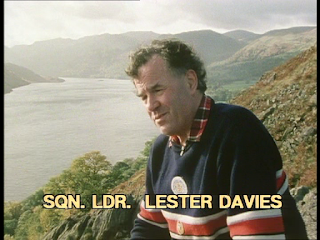John P Higgins' Mysterious World
I've been watching Arthur C Clark's Mysterious World. It's pure nostalgia, if nostalgia is ever pure. It looks like the Britain of my childhood, and I am definitely old because that place doesn't resemble the modern world at all. It isn't my world, of course. My world was full of shouting kids. It looked like the "Baggy Trousers" video. Arthur C Clarke presents a world full of old people, old people with titles. The women who encounter ball lightning in a cafe, are both called "Mrs". Professors are always professors and look like professors. Lord Hunt of Everest gets his full name, in a yellow banner with red piping which makes him look as if he is on offer at Londis.
Everything is brown and grey and green, as though colour were still on the ration. The graininess of the film stock, a trick of the mind, is how I remember the past - slightly sun-bleached, pale and blue like a forgotten poster in a post office window. The buildings looked older, when obviously they must have been younger. Fabrics are mundane: bobbling wool stretched over distended bodies. Hair riots, bursts out all over, woolly white halos fizzing with split ends, or ploughed into narrow greasy furrows with a tortoise-shell comb and week old hair oil. Cigarettes are waved for emphasis, teeth are imperfect and human, come in an array of shapes and colours and just tossed into mouths. Everyone is white, except in Arthur's Sri Lankan retreat, where nobody but Arthur is.
I was nine when this program was made. It was actually made in 1980 but you'd swear it was five years older than that. The 80's has not touched anyone filmed. Punk has not happened here. You'd swear they were still doggedly fighting the war, their toggled cardigans done up incorrectly, their shiny seated trousers kept in place with garden twine. My mum was an impossibly young forty when this was made. These were the sorts of people she would have encountered in her adopted country.
It's very easy to be seduced by the quaintness of these cranks and old duffers, with their strange perms and inherited pearls. The little Englishness, the fusty hobbyism of it all. You wouldn't want to get into a chat about politics with any of them - trenchant views expressed on the "Irish" and "the colour problem", no doubt. But there is something about them. They know who they are. They fought a war and they won. They are not naturals for television - they don't quite know where to look and they rub their eyes and noses too much and they've always got a fag on - but they hold your gaze. They expect to be respected. They expect to be listened to. No one ever doubted or questioned them. They have steel. This is the last generation to have an empire, and they remember a time when the sun didn't set without asking an English person for permission first.
They're old, of course - a survivor of the Titanic is interviewed - and they're mostly posh. Eccentricity was a rich man's game in the past, and almost everyone interviewed here has peculiar views and hobby horses. They're academics engaged in fringe sciences, or they're obsessives whose madness has reached the critical mass of national exposure. Quite a few are just liars, their claims debunked and exposed in subsequent decades. The working classes - the sort of people I would have been far more likely to encounter - are far less sure of themselves. They're nervous on camera, less certain. For some reason they're far more likely to be filmed outside, mother's with babes in arms standing on the doorstep or leaning awkwardly against garden fences. They don't have the practiced bridge club banter of the middle-classes. They can't believe that anyone wants to listen to them, where the poshoes have the expectation they're fascinating. They've always been listened to. This silly ass with the camera is hardly going to come all the way to Cambridge if he didn't want to hear what they had to say. This is the secret wealth of the wealthy - they know they're right because they always have been.
This is an unplugged, disconnected world. A country where class distinctions are unspoken and ever-present. It is a natural order here: 1980 was a feudal proposition. There is no internet, there is no reality TV. These people are cut off from one another. They are shed dwellers. Their three television stations are still full of old posh men in specs talking down to them. The working classes, or anyone with an accent that isn't RP are only ever comic relief with the odd exception of Arthur himself, who's never lost his broad Somerset accent and sounds like a yokel in a Two Ronnies sketch. Only Arthur, Dave Prowse and the Anchor Butter Men sounded like that on telly then.
This was forty years ago and it's another country. I recognise it and realise it's no longer there. All those people are dead and their certainties dead with them. Their children were the Baby Boomers. Are they now called "The Greatest Generation" by middle-aged war obsessives? I think they are. And I think they would pooh pooh that ridiculous name, while secretly agreeing that yes, they probably were.



Comments
Post a Comment